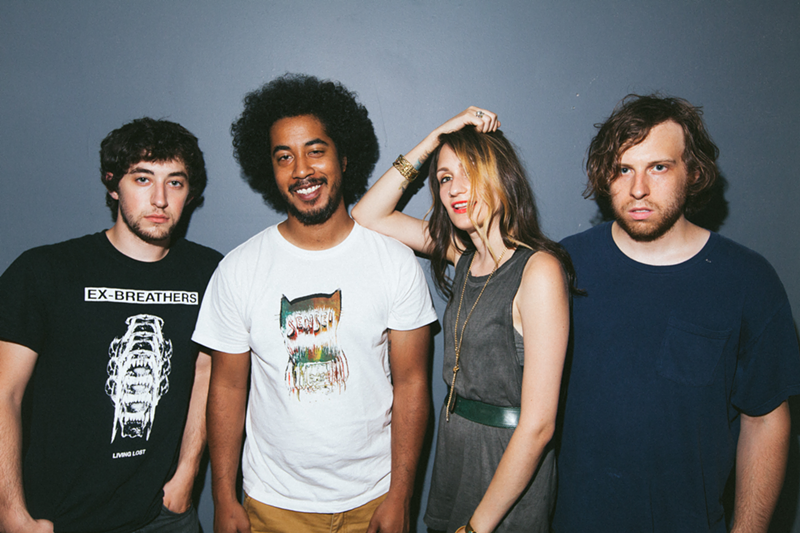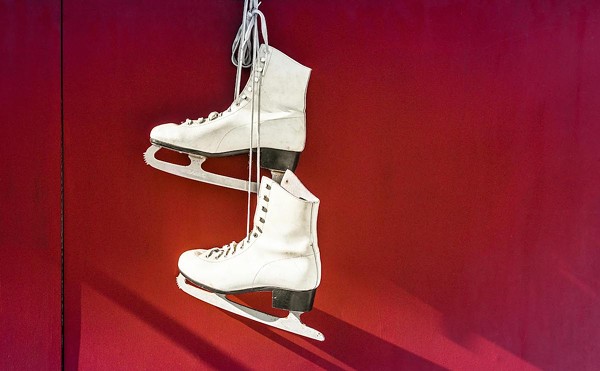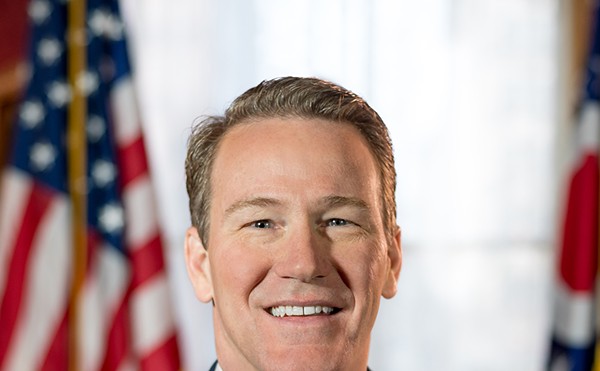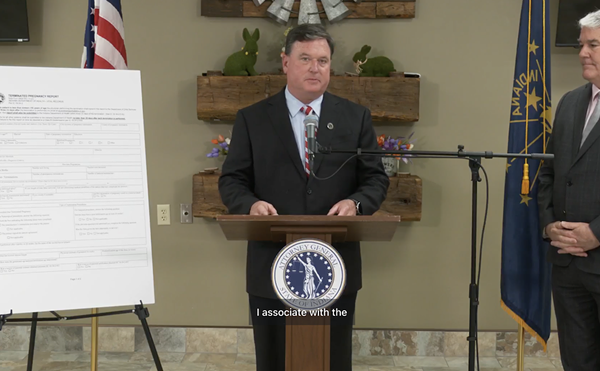Speedy Ortiz has gone from basement shows in the quartet's native Northampton, Mass., to massive festivals like Bonnarro in whiplash fashion. Yet the band — singer/guitarist/main songwriter Sadie Dupuis, drummer Mike Falcone, bassist Darl Ferm and new guitarist Devin McKnight — has handled the transition deftly, delivering its slanted, guitar-driven ditties with the same offhanded grace no matter the setting.
Much has been made of Speedy Ortiz's evocation of early ’90s Alt Rock — think Pavement fronted by prime-era Liz Phair — but Dupuis' wiseass lyrical turns are all her own, bringing to mind a less oblique version of Stephen Malkmus. That probably shouldn't come as a surprise — she's an academically accomplished poet who also worked at Spin for a spell.
CityBeat recently connected with Falcone to discuss the band's follow-up to 2013's buzzed-about breakthrough full-length, Major Arcana, Dupuis' singular yet hard-to-define songwriting style and the possibility of REO Speedwagon playing a basement show.
CityBeat: I hear you guys are in the process of recording another album. Who are you working with this time?
Mike Falcone: We're recording it in the Rare Book Room in Brooklyn with two of our friends who recorded with us back in April, Nico (Vernhes) and Gabe (Wax). They've recorded a couple hundred albums. I know they've done all of Deerhunter's releases. I don't know if Nico recorded Ted Leo's Hearts of Oak album in that studio specifically, but he did record that, and that's a kind of bare-bones one guitar, one bass, drummer and vocals. And I'm pretty sure they also recorded the Black Dice album Repo, which is one of the craziest, weirdest studio-driven freakout things I've ever heard. They're pretty accomplished. They've done all kinds of stuff. I'm excited for people to hear what we're doing, because it feels like this is comfortable and correct for us to be sounding this way at this point.
CB: Speaking of your sound, you guys constantly get compared to a lot of early ’90s Alt Rock bands. Are you cool with that? Do you guys get sick of the endless comparisons and name-checks?
MF: We love those bands. All of us really love ’90s Rock music a lot. We're fans of all music in general, and the ideas that go into our songs and the arrangements and the way we perform them is a lot more informed by the spectrum of Pop and Rock music as a whole. And maybe even some Hip Hop in there as well. For whatever reason, when all of that stuff gets combined with these four specific people playing on it, most of the people who hear it want to associate it with early ’90s Rock, which is cool if that's something that helps people get into it, but it was never something intentional on our part. If anything, we're mostly influenced by the stuff that's happening presently.
CB: What do you think makes Sadie unique or interesting as a songwriter?
MF: Her songwriting contains a lot of the elements that I find interesting — much more so than other bands that play four chords over and over again. It's hard to make that kind of formula something that's … I'm trying to think of a good way to say it. There's just a lot of interesting things in it that I don't hear in other people's songwriting. I hear a song that she writes and right away I know that it's her, so she definitely has her own style in that respect. This is a hard question. (Laughs.) We'll come back to it.
CB: How does the songwriting process work? Does Sadie come up with demos and then brings them to the rest of the band?
MF: Yeah, she writes all the songs on GarageBand and demos them, and then we work on them, just figuring out parts that fit. So if there is anything specific that anybody wants to suggest for any particular instrument, we try to do that between the time when the song is demoed and when we're actually working on the final product, which is now. So the evolution of all of the songs, some of them are pretty different than when they were first demoed.
CB: You guys have played a lot of festivals this year. How do you think that has impacted the songs you're writing and recording now? Do you feel like they have to be bigger or different in any way?
MF: I don't think so. Bigger stages or smaller stages or playing in a basement or in a DIY space or playing in a club, I think that's one thing that is nice about the type of music that we play: you can play on a big stage or you can play it in someone's basement. You'll get a different type of energy out of it, but it still sounds cool being played in any type of venue. Whereas an arena Rock band like REO Speedwagon, or something, their music probably sounds best playing it on a huge stage as opposed to playing it in someone's basement. Although that would be pretty interesting to see REO Speedwagon playing in somebody's basement. (Laughs.)
CB: What's it been like for you guys to go from playing basement shows to Bonnaroo almost overnight? I heard you were riding to the stage at Bonnarro in a golf cart. Has the quick transition been surreal for you?
MF: I guess so. It's pretty great to go to all these festivals for free. I never planned on going to Bonnarro. I never felt that it was something that I would ever enjoy, but it wasn't that bad. For me personally it's been surreal to go to all these festivals that I thought I'd never go to. We got to see Lionel Ritchie. I never expected that, and he was great.
CB: Do you want to come back to that Sadie question before we wrap up?
MF: Yes, though I'm still not sure how to answer it, other than that I'm pumped as hell to be playing in a band with her.
SPEEDY ORTIZ plays the MidPoint Music Festival Saturday at Know Theatre.






